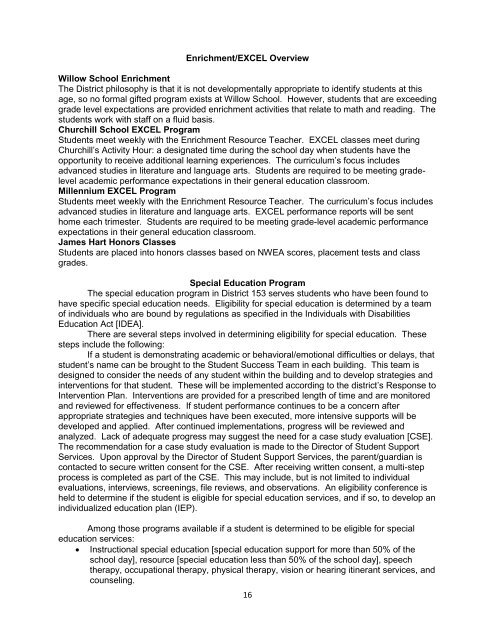Parent Handbook - Homewood School District 153
Parent Handbook - Homewood School District 153
Parent Handbook - Homewood School District 153
- No tags were found...
Create successful ePaper yourself
Turn your PDF publications into a flip-book with our unique Google optimized e-Paper software.
Enrichment/EXCEL Overview<br />
Willow <strong>School</strong> Enrichment<br />
The <strong>District</strong> philosophy is that it is not developmentally appropriate to identify students at this<br />
age, so no formal gifted program exists at Willow <strong>School</strong>. However, students that are exceeding<br />
grade level expectations are provided enrichment activities that relate to math and reading. The<br />
students work with staff on a fluid basis.<br />
Churchill <strong>School</strong> EXCEL Program<br />
Students meet weekly with the Enrichment Resource Teacher. EXCEL classes meet during<br />
Churchill’s Activity Hour: a designated time during the school day when students have the<br />
opportunity to receive additional learning experiences. The curriculum’s focus includes<br />
advanced studies in literature and language arts. Students are required to be meeting gradelevel<br />
academic performance expectations in their general education classroom.<br />
Millennium EXCEL Program<br />
Students meet weekly with the Enrichment Resource Teacher. The curriculum’s focus includes<br />
advanced studies in literature and language arts. EXCEL performance reports will be sent<br />
home each trimester. Students are required to be meeting grade-level academic performance<br />
expectations in their general education classroom.<br />
James Hart Honors Classes<br />
Students are placed into honors classes based on NWEA scores, placement tests and class<br />
grades.<br />
Special Education Program<br />
The special education program in <strong>District</strong> <strong>153</strong> serves students who have been found to<br />
have specific special education needs. Eligibility for special education is determined by a team<br />
of individuals who are bound by regulations as specified in the Individuals with Disabilities<br />
Education Act [IDEA].<br />
There are several steps involved in determining eligibility for special education. These<br />
steps include the following:<br />
If a student is demonstrating academic or behavioral/emotional difficulties or delays, that<br />
student’s name can be brought to the Student Success Team in each building. This team is<br />
designed to consider the needs of any student within the building and to develop strategies and<br />
interventions for that student. These will be implemented according to the district’s Response to<br />
Intervention Plan. Interventions are provided for a prescribed length of time and are monitored<br />
and reviewed for effectiveness. If student performance continues to be a concern after<br />
appropriate strategies and techniques have been executed, more intensive supports will be<br />
developed and applied. After continued implementations, progress will be reviewed and<br />
analyzed. Lack of adequate progress may suggest the need for a case study evaluation [CSE].<br />
The recommendation for a case study evaluation is made to the Director of Student Support<br />
Services. Upon approval by the Director of Student Support Services, the parent/guardian is<br />
contacted to secure written consent for the CSE. After receiving written consent, a multi-step<br />
process is completed as part of the CSE. This may include, but is not limited to individual<br />
evaluations, interviews, screenings, file reviews, and observations. An eligibility conference is<br />
held to determine if the student is eligible for special education services, and if so, to develop an<br />
individualized education plan (IEP).<br />
Among those programs available if a student is determined to be eligible for special<br />
education services:<br />
Instructional special education [special education support for more than 50% of the<br />
school day], resource [special education less than 50% of the school day], speech<br />
therapy, occupational therapy, physical therapy, vision or hearing itinerant services, and<br />
counseling.<br />
16





